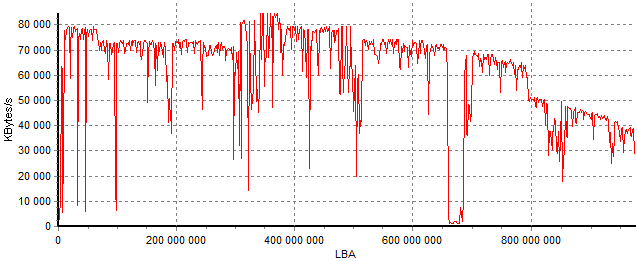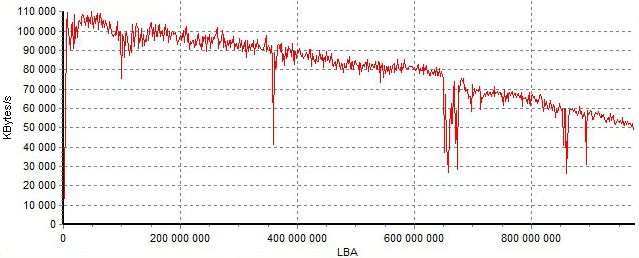2014-05-02 - failing disk
some time ago my sister started to complain about her laptop working slow and freezing often, at random moments, for a few seconds. a bit of testing shown no (known) viruses, next to none CPU load and next to none extra I/O (well – it was windows, by let's say it was close enough to zero). after some time i decided to run a disk scan, using hdd scan. plot of reading speed vs. position on disk looked like this:
there are clearly locations on the disk, that do not work well – transfer drops there significantly. around 3/4 of the way i dropped to a nearly zero. clearly disk was dying.
the funny thing is how it is happening. “regular” disks have extra logic that tries to correct errors along the way: move failing sectors, correct corrupted data, mark bad blocks… from the user point of view all of this results in a performance drop, up to a “random freezes” point. this might be nice/acceptable for regular user, as one just want's be able to copy her data out of a dying surface.
this is however a pain in the neck when you have a RAID (non-0 RAID, to be precise) on your computer. having the same data on more than one disk means fail-fast is the best approach. if disk cannot read something, it should just mark block as dead, report an error and let RAID controller read required data from other (usually still operational) disk. this is the tactics so called “RAID edition” disks have. the problem is their price, which is usually ~2-4x more expensive than “regular” ones. funny part is having an extra (error-correcting) logic, means lower price. ;)
any way, after buying a new drive plot came back to normal:
the new disk looks (more-less) healthy. though both disks had the same capacity, new one is significantly faster. from the plot one can also see this is clearly a rotary-plate drive, as reading speed decreases while moving towards end of disk pace (i.e. center of the disk). this happens due to non-uniform sectors density in each cylinder, that increases both capacity and speed, while moving away from the center of the disk (physical CHS is a thing of the past for decades now).


